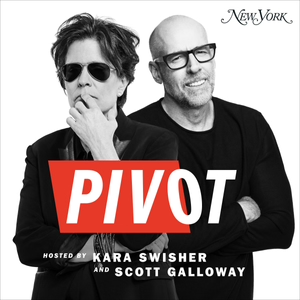
Unconscious Bias: Is AI dividing us?
07/11/23 • 42 min
Bad AI is becoming a major headache for organizations. Tech is a male-dominated sphere, which means that it produces, inherently, male-skewed AI driven by unconsciously biased datasets. The effects of this can be measurable. Run through the same AI, women can receive worse credit or loan agreements than their male counterparts, be pushed out from job openings, receive worse medical treatment, or even receive performance penalties for doing the same work as men to the same standard. So how has this situation emerged and, more importantly, what can be done about it?
In this episode, we speak to Erin Young, research scientist from the Alan Turing Institute, who are dedicated to solving societal problems using technology. Their research has found deep structural inequalities in the field of AI, including higher attrition rates for women, who are generally filling lower paid, less prestigious jobs than their male counterparts.
That's having a tangible, real-world effect. Anjana Susarla is a professor in Responsible AI from the University of Michigan. She's been tracking instances of biased AI finding its way into society, including documented cases of women in common-property states where spouses incomes and assets are joined being given lower credit limits on cards than their male counterparts. She also documents several cases of poor AI decision making in AI-assisted hiring and HR systems.
So should these systems be using AI at all? Well, Ivana Bartoletti argues that sometimes, AI isn't the answer. She's the Global Chief Privacy Officer at WiPro, and an expert on bias in AI. She notes several cases where institutional bias has been backed up by AIs which reflected existing societal pre-conceptions, for example in AI giving lower exam scores to pupils from poorer backgrounds in the UK, and lower state benefits to migrants in the Netherlands.
So what should be done? HPE's Chief Technology Officer Fidelma Russo argues that, as project leaders and managers, a lack of diversity in AI and the creeping problems it's causing should have been identified by the industry some time ago. She says drastic change is now needed to fix the problem. Fortunately, it's one the industry is rapidly becoming aware of and is now at pains to fix.
Bad AI is becoming a major headache for organizations. Tech is a male-dominated sphere, which means that it produces, inherently, male-skewed AI driven by unconsciously biased datasets. The effects of this can be measurable. Run through the same AI, women can receive worse credit or loan agreements than their male counterparts, be pushed out from job openings, receive worse medical treatment, or even receive performance penalties for doing the same work as men to the same standard. So how has this situation emerged and, more importantly, what can be done about it?
In this episode, we speak to Erin Young, research scientist from the Alan Turing Institute, who are dedicated to solving societal problems using technology. Their research has found deep structural inequalities in the field of AI, including higher attrition rates for women, who are generally filling lower paid, less prestigious jobs than their male counterparts.
That's having a tangible, real-world effect. Anjana Susarla is a professor in Responsible AI from the University of Michigan. She's been tracking instances of biased AI finding its way into society, including documented cases of women in common-property states where spouses incomes and assets are joined being given lower credit limits on cards than their male counterparts. She also documents several cases of poor AI decision making in AI-assisted hiring and HR systems.
So should these systems be using AI at all? Well, Ivana Bartoletti argues that sometimes, AI isn't the answer. She's the Global Chief Privacy Officer at WiPro, and an expert on bias in AI. She notes several cases where institutional bias has been backed up by AIs which reflected existing societal pre-conceptions, for example in AI giving lower exam scores to pupils from poorer backgrounds in the UK, and lower state benefits to migrants in the Netherlands.
So what should be done? HPE's Chief Technology Officer Fidelma Russo argues that, as project leaders and managers, a lack of diversity in AI and the creeping problems it's causing should have been identified by the industry some time ago. She says drastic change is now needed to fix the problem. Fortunately, it's one the industry is rapidly becoming aware of and is now at pains to fix.
Previous Episode

Welcome to Technology Untangled: Season 4 Trailer
Welcome to season four of Technology Untangled from Hewlett Packard Enterprise. A new series means a new format, so join your hosts - yes, plural - Michael Bird and Aubrey Lovell in unravelling the stories and technologies which are changing the way we work. Every two weeks, we take a look at an emergent story in technology and interview experts from across the field to get behind the headlines and find out what's going on and why it matters.
Coming up in this season, we'll be looking at bias in AI, the rise of Exascale computing, and revolutions in healthcare among many more.
Subscribe on your podcast app of choice so you don't miss out.
Next Episode

Can technology help to rebuild after disasters?
2022 saw 421 registered natural disasters worldwide, including floods, drought, famine and earthquakes. It also saw new or escalating conflicts in Sudan, Syria and Ukraine. Thousands of NGOs, activists and charity groups do what they can to help those in need, whilst Governments and research groups try to come up with better ways of predicting, mitigating and avoiding disasters.
But you may be surprised to know there's a whole heap of ways that tech can help with rebuilding and prevention efforts. In this episode, we look at how grassroots groups and major organizations work together to leverage lateral thinking, agile mindsets, and technological expertise to mitigate the effects of societal upheaval, and even help in rebuilding efforts.
This episode was inspired by meeting Valerie Kuzmenko, a tech executive from Donetsk, who had to flee when the area became the epicentre of the original Ukraine war in 2014. In 2022, she found herself in Kyiv at the start of the invasion, and had to flee to London with her family and nothing more than a suitcase. Since recording this episode, she's found work as the Chief Marketing Officer at ScaleLabTech.
Using tech to rebuild society is a field which draws together large and small organisations in partnership. At the larger end of the scale are organizations like Airbel labs. They are the research arm of the International Rescue Committee. Atish Gonsalves heads up their EdTech wing. Airbel partner with a number of large organizations such as Whatsapp to provide educational solutions in areas where schooling is difficult, and work hard to provide not only resources for children who would otherwise be out of education for long periods, but also to help teachers continue to operate through tough times and disaster recovery.
Likewise, Hewlett Packard Enterprise use their technological expertise to provide solutions and assistance on some of the most pressing humanitarian issues, for example working with the American Red Cross to use AI to help route and maintain supplies of donated blood. However, HPE Head of Global Social Impact and Deputy Director of the HPE Foundation Fred Tan explains, it's by helping provide solutions and partnering with smaller, grassroots organisations that can encourage new ways of thinking and problem solving which can make a truly global difference, as well as encouraging HPE to think about its own operations.
And on the ground, small organizations are doing truly remarkable work with technology. We're joined by Oksana Simnova and Vatalii Lopushanskyi of RebuildUA and UADamage respectively. These two groups grew out of very different fields - RebuildUA was in Argitech working on drone mapping Ukraine's enormous farms, and UADamage grew out of a team working on Neural Network and AI applications. They now work closely together, using drones and satellite images to map out damage to buildings in Ukraine, and then logging and assessing the damage caused and matching it against pre-war imagery to assess the need for repair. They are hopeful that their findings will help rebuild Ukraine, but also be useful in mine clearing activities in future war zones.
If you like this episode you’ll love
Episode Comments
Generate a badge
Get a badge for your website that links back to this episode
<a href="https://goodpods.com/podcasts/technology-untangled-282214/unconscious-bias-is-ai-dividing-us-35284012"> <img src="https://storage.googleapis.com/goodpods-images-bucket/badges/generic-badge-1.svg" alt="listen to unconscious bias: is ai dividing us? on goodpods" style="width: 225px" /> </a>
Copy




